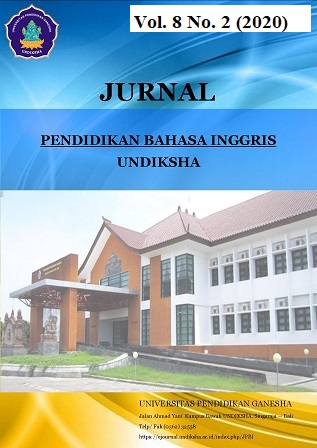FEATURES OF VOCABULARY EXERCISES IN ENGLISH BOOK AT TEN GRADE STUDENTS
DOI:
https://doi.org/10.23887/jpbi.v8i2.30621Abstract
The purpose of this journal analysis is to train the effectiveness of English Foreign Language student practice exercises and vocabulary mastery and reading comprehension. Two specific factors conditions: (a) vocabulary acquisition and retention of different exercises; (b) reading comprehension performance through different exercises. That the results revealed that the qualitative group received significant and superior practice questions and vocabulary mastery the control group who received vocabulary copying exercises on the performance of increasing students' vocabulary, reading comprehension, as well as short-term and long-term word memory retention. Positive correlation between vocabulary knowledge and reading comprehension are also considered. Hence, ignore that vocabulary mastery and question exercises are the more effective types of exercises for vocabulary acquisition and reading understanding.
References
Agirrezabal, Manex (2018). Creating Vocabulary Exercises Through NPL. University of Copenhagen.
Baharudin, Harun and Zawawi Ismail. (2014). Vocabulary Learning Strategies and Arabic Vocabulary Size among Pre-University Students in Malaysia. International Education Studies; Vol. 7, No. 13; 2014 ISSN 1913-9020 E-ISSN 1913-9039 Published by Canadian Center of Science and Education.
Boonkongsaen, N and C. Intaraprasert. (2014). English Vocabulary Learning Strategies Employed by Thai Tertiary-Levels Students with Different Genders and Levels of Vocabulary Proficiency. International Journal of Scientific and Research Publications, Volume 4, Issue 3, March 2014 1 ISSN 2250-3153 www.ijsrp.org.
Kuśnierek, Anna. (2016). The role of music and songs in teaching English vocabulary to students. World Scientific News 43(1) (2016) 1-55.
Larsen. K. Katharina (2017). Vocabulary and EFL Textbooks, Department of Foreign Languages. University of Bergen. Master’s Thesis.
Lyding, dkk. (2020). Using Crowdsourced Exercises for Vocabulary Training to Expand ConceltNet, European Language Resources Association (ELRA).
Malik, R. Singh and Fuad A. Hamied. (2016). Research Method A Guide for First Time Researchers. Bandung: UPI PRESS.
Nayan, Surina and Hariharan N.K. (2015). A Preliminary Study on Vocabulary Learning Strategies Used by the Students from the Faculty of Accountancy. International Journal of Languages, Literature and Linguistics, Vol. 1, No. 1, March 2015.
Purwanti, et. al. (2015). Relationship between Vocabulary Mastery and Vocabulary Learning Strategies.
Ratsgoo, Azadeh. (2011). Intentional and Incidental Vocabulary Learning through Listening Comprehension. University of Kashan. Unpublished Thesis.
Panjaitan, Roselma. (2018), An Analysis Students’ Ability in Using Personal Pronouns in Narrative Text, University of Prima Indonesia. Thesis.
Thornbury, Scout. (2002). How to Teach Vocabulary. London : Longman.
Utami, Yheni Siwi. (2014). Improving Students’ Vocabulary Mastery Using Crossword Puzzles For Grade Vii Of Smpn 2 Srandakan In The Academic Year Of 2013/2014. Unpublished magister thesis. Yogyakarta State University.
Walters, Jodee and Neval Bozkurt. (2009). The Effect of Keeping Vocabulary Notebooks on Vocabulary Acquisition. Ankara : Bilkent University. Language Teaching Research 13,4 (2009); pp. 403–423. http://www.sagepub.co.uk/journalspermissions.nav.
Downloads
Issue
Section
License
Authors who publish with the Jurnal Pendidikan Bahasa Inggris Undiksha agree to the following terms:- Authors retain copyright and grant the journal the right of first publication with the work simultaneously licensed under a Creative Commons Attribution License (CC BY-SA 4.0) that allows others to share the work with an acknowledgment of the work's authorship and initial publication in this journal
- Authors are able to enter into separate, additional contractual arrangements for the non-exclusive distribution of the journal's published version of the work (e.g., post it to an institutional repository or publish it in a book), with an acknowledgment of its initial publication in this journal.
- Authors are permitted and encouraged to post their work online (e.g., in institutional repositories or on their website) prior to and during the submission process, as it can lead to productive exchanges, as well as earlier and greater citation of published work. (See The Effect of Open Access)













